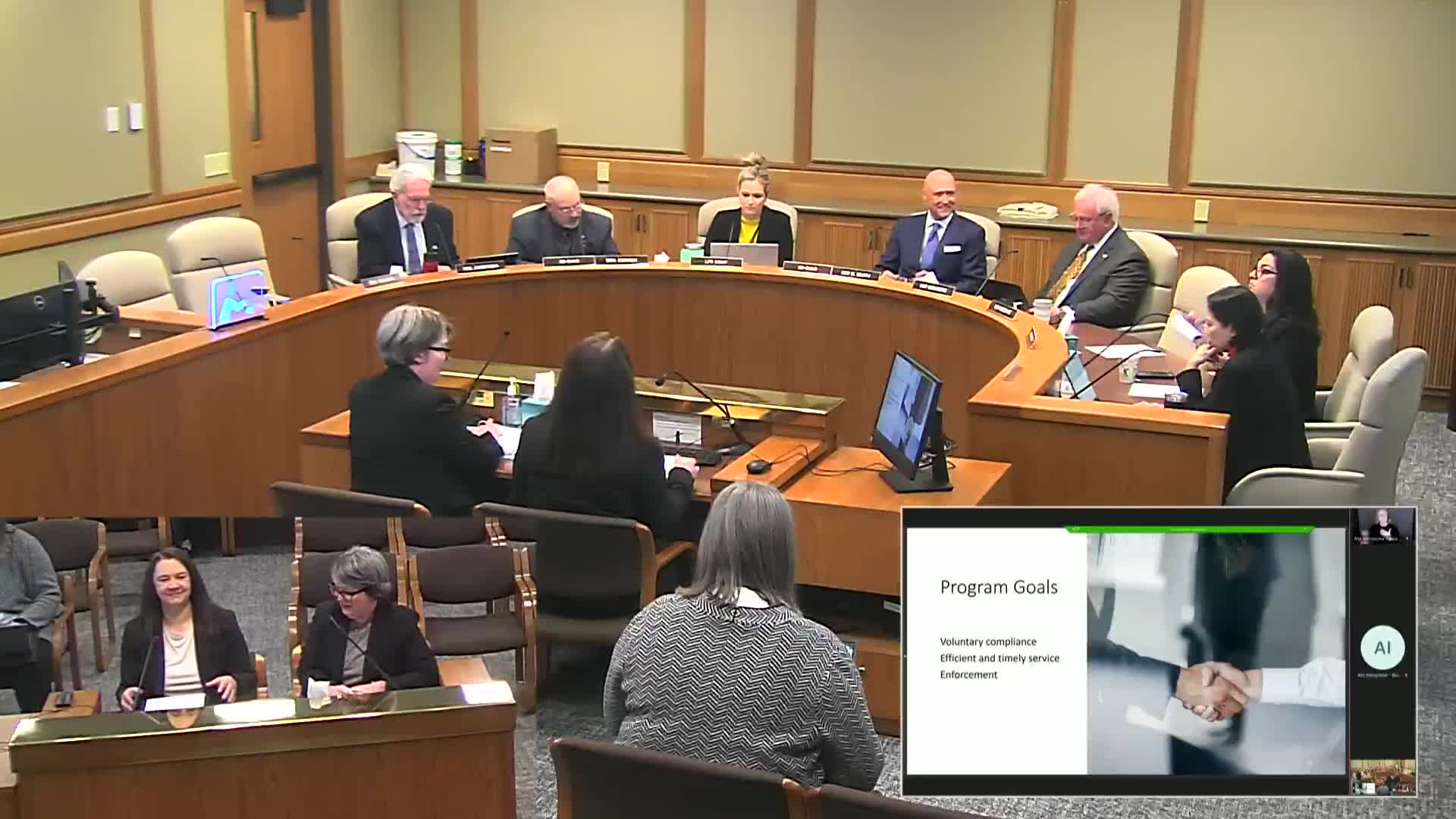Oregon Department of Revenue business division cites enforcement gains, lodging-tax challenges in budget briefing
Get AI-powered insights, summaries, and transcripts
Subscribe
Summary
Oregon Department of Revenue Director Betsy Eimholt and Business Division Administrator Katie Lawley told the Ways and Means subcommittee on March 11 that enforcement activity and several customer-service measures improved in the business division, but the agency still faces challenges identifying untaxed short-term lodging and hiring experienced tax auditors.
Oregon Department of Revenue Director Betsy Eimholt and Business Division Administrator Katie Lawley told the Joint Committee on Ways and Means Subcommittee on General Government on March 11 that the business division has increased enforcement activity and improved some customer-service measures while continuing to implement several new tax programs.
Lawley said the division handled more than 106,000 calls in calendar year 2024 and reduced average wait times to about 6.5 minutes. The division completed nearly 110,000 enforcement cases in the business division last year, and staff attended 96 outreach events statewide. Lawley said registration work increased to about 33,600 items and that the division reviews returns that cannot be processed automatically and checks refunds before they are issued.
Why it matters: The business division administers many state and locally delegated tax programs that affect employers and retail businesses; changes to enforcement and collection affect state and local revenue and taxpayer experience.
Division workload and program counts: Lawley said the department administers transient lodging and marijuana retail programs for localities (27 lodging localities and 94 marijuana localities were cited) and administers tobacco retail licensing in counties that contract with the Department of Revenue. She told the committee the department also administers two transit programs (TriMet and Lane County) on behalf of localities.
On point of technical corrections, Lawley corrected testimony from the prior day: the department currently accepts ACH payments for marijuana retailers and is working to implement credit-card acceptance but has not yet done so.
Lodging tax enforcement and short-term rentals: Legislators asked whether the department captures revenue from vacation rentals and intermediary platforms such as Airbnb. Lawley said the department dedicates audit resources to lodging programs and shares data with localities, but she acknowledged limits on available address-level data from major intermediaries. Legislators and committee members pressed for additional ways to find untaxed lodging inventory; the department said it looks at advertising and other registration sources and will continue to pursue detection methods.
Payroll reporting and combined reporting changes: Lawley described ongoing work on the combined payroll reporting product that allows employers to pay up to seven payroll-related taxes in a single process. She said the division is in the final stages of a product project to identify improvements and efficiencies in that combined reporting process, and that larger structural changes may require additional agency capacity.
New programs, process improvements, and training: The presentation listed 14 new tax or fee programs the department has implemented since 2018; Lawley highlighted two recent additions—the kratom registration program (effective 07/01/2023; 70 registrants) and collection of the 988 coordinated crisis service fee using the same return format as E-911. Lawley and director-level staff described process improvements including a consolidated contact center phone line for special business programs and additional training and recruitment changes to broaden candidate pools for tax-auditor roles.
Hiring and workforce initiatives: Committee members asked about difficulty hiring tax auditors. Lawley said the agency broadened minimum qualifications and updated hiring and training practices. Members asked the department to review external workforce-development programs (for example, tuition support programs for potential CPAs); Lawley said the department would look into those and referenced an existing state program, Uplift Oregon, that supports accounting training for employees.
Budget overview for the business division: The department presented the governor's requested budget figures for business-division programs included in Senate Bill 5536: $44,100,000 all funds and 140 FTE for the business division; a $4,400,000 other-funds limitation and 10 FTE for the marijuana program (expenses paid from marijuana funds prior to distribution); and $18,500,000 other-funds limitation and 49.23 FTE for the corporate (CAAT) program. No policy option packages were included in the governor's request for these items.
Ending: Committee members thanked department staff and the hearing continued with property-tax and collections presentations scheduled for the remainder of the day and the next meeting.
